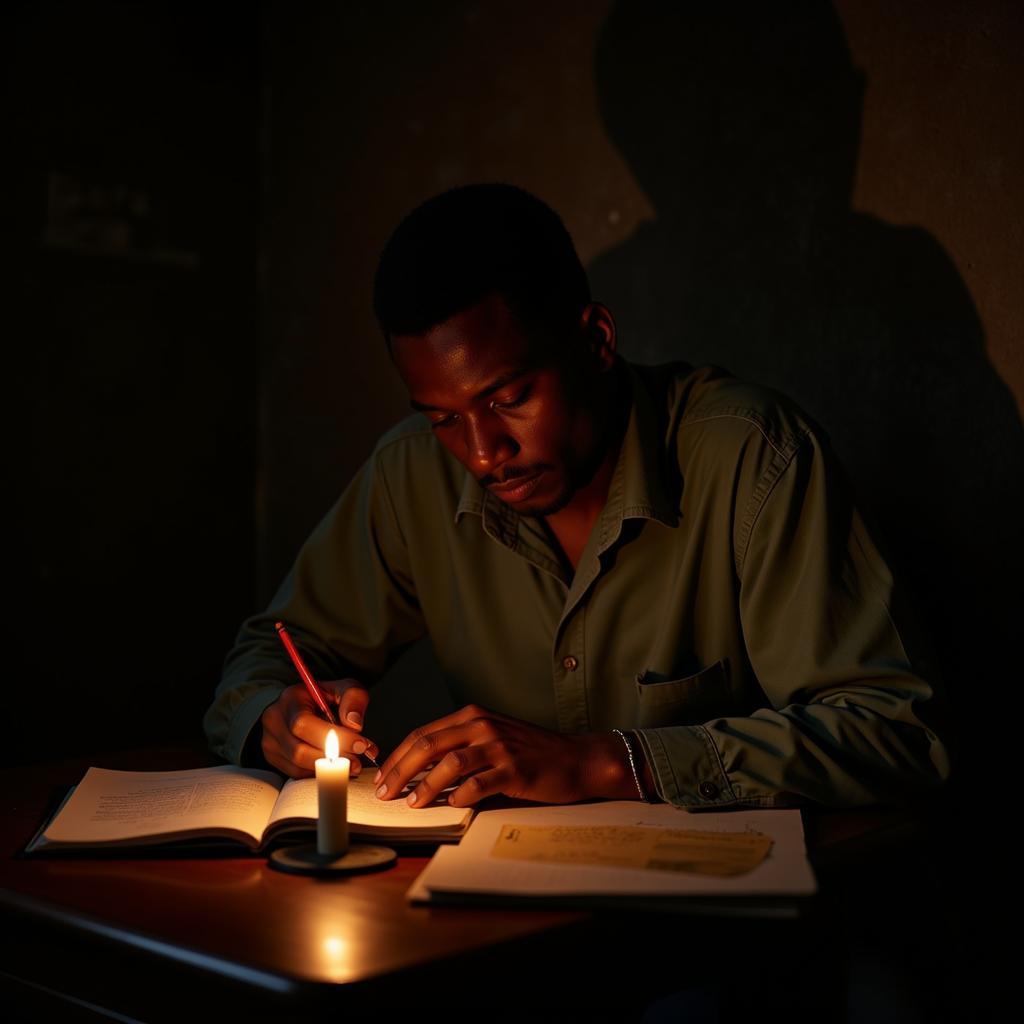African Freedom Fighter Solitude: The Untold Stories of Resilience and Reflection
The weight of fighting for freedom, coupled with the inevitable periods of African Freedom Fighter Solitude, shaped the narratives of Africa’s liberation movements. This article delves into the often-overlooked aspect of solitude experienced by African freedom fighters, exploring how these moments of isolation fostered resilience, strategic thinking, and profound personal transformations.
The Burden of Leadership and the Embrace of Solitude
Leading a revolution requires immense courage, unwavering dedication, and often, confronting profound loneliness. African freedom fighters, burdened with the responsibility of their people’s liberation, frequently found solace and clarity in solitude. These moments of introspection, away from the clamor of the battlefield or the pressures of political negotiation, allowed them to reconnect with their purpose, strategize, and find the inner strength to persevere.
For many, the wilderness became a sanctuary. The vast landscapes of Africa, from the Sahara to the savannas, provided a space for contemplation and a connection to ancestral spirits. This connection to the land fueled their determination and provided a sense of belonging in the face of overwhelming odds.
Solitude as a Catalyst for Strategic Thinking
Solitude wasn’t simply a refuge; it was a strategic tool. Away from the distractions of daily struggle, freedom fighters could analyze the political landscape, assess their resources, and devise innovative tactics. The quiet of isolation fostered clear thinking, allowing them to anticipate their opponents’ moves and develop effective counter-strategies. This strategic advantage, born from solitude, played a crucial role in many successful liberation movements across the continent.
Nelson Mandela’s time in prison, though forced upon him, became a period of intense reflection and strategic planning. His letters and writings from this period reveal a deep understanding of the political dynamics at play, and his subsequent actions upon release demonstrate the power of solitary reflection in shaping his leadership.
The Psychological Toll of Isolation and the Strength to Overcome
While solitude offered strategic advantages and spiritual renewal, it also presented significant psychological challenges. The constant threat of capture, the loss of comrades, and the separation from loved ones took a heavy toll. However, it was in these moments of profound vulnerability that the true resilience of African freedom fighters shone through. They developed coping mechanisms, drawing strength from their convictions, their communities, and their vision for a free Africa.
 African freedom fighter writing in a journal by candlelight
African freedom fighter writing in a journal by candlelight
The Legacy of Solitude: Shaping Post-Independence Africa
The experiences of solitude shaped not only the individuals but also the trajectory of post-independence Africa. The values of resilience, strategic thinking, and deep introspection, honed in moments of isolation, became ingrained in the leadership styles and political philosophies of newly formed nations. The legacy of these freedom fighters reminds us of the power of individual reflection in shaping collective destinies.
Dr. Abena Nkrumah, a renowned historian specializing in African liberation movements, notes, “The solitude experienced by freedom fighters wasn’t just about physical isolation; it was a crucible that forged their character and shaped their vision for a better future.”
Remembering the Unsung Heroes
The stories of african freedom fighter solitude are often untold, overshadowed by the grand narratives of battles won and independence achieved. However, it is in these quieter moments of reflection and resilience that we find the true heart of the African liberation struggle. These untold stories remind us of the immense sacrifices made, the unwavering commitment to freedom, and the enduring power of the human spirit.
Conclusion
African freedom fighter solitude played a pivotal role in shaping the continent’s history. These moments of isolation, often born out of necessity, became sources of strength, strategic clarity, and profound personal transformation. By understanding and acknowledging the significance of these experiences, we gain a deeper appreciation for the complexities of the African liberation struggle and the enduring legacy of its unsung heroes. Remembering african freedom fighter solitude is essential to understanding the full narrative of Africa’s journey to freedom.
FAQ
- How did solitude contribute to the success of African liberation movements?
- What were some of the psychological challenges faced by freedom fighters in isolation?
- How did the experiences of solitude shape post-independence Africa?
- Why are the stories of african freedom fighter solitude often overlooked?
- How can we better understand and acknowledge the significance of these experiences?
- What are some resources for learning more about individual freedom fighters and their experiences?
- How did the natural environment play a role in the experience of solitude for freedom fighters?
More Resources
- Explore other articles on our website about specific African liberation movements.
- Discover the personal stories of freedom fighters through biographies and historical accounts.
- Learn more about the political and social context of African liberation struggles.
Need support? Contact us 24/7: Phone: +255768904061, Email: kaka.mag@gmail.com, or visit us at Mbarali DC Mawindi, Kangaga, Tanzania.

